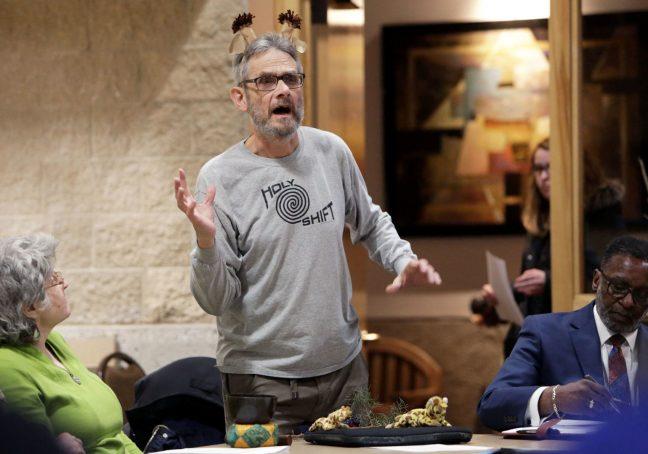It’s been said that nothing is as it appears — and if appearance was truly indicative of a person, Carl Landsness would be a giraffe rather than a human being. But that’s not the only interesting thing about the 66-year old political activist, who dons giraffe ears and face paint at Madison City Council meetings.
Landsness is the Council’s own gadfly, which can be defined as a citizen who frequents government meetings and offers their insight and opinions on local issues. Oftentimes these gadflies have personal agendas behind their presence, whether it be to lower taxes or fix certain roads. But Landsness’ goals are even more personal than that. Whether he advocates at a finance committee meeting or to the chief of police, Landsness claims “the world may be too complex to figure out with our intellects any more,” and advocates for more personal responsibility rather than increased policy.
In lieu of thinking and policing with our heads, we should listen with our whole hearts. Hence, the giraffe ears, as giraffes have one of the largest hearts of any land animal.
“When I put these ears on, I can’t hear the judgments, analyses of the head anymore even if you attack me and call me a name,” Landsness said. “All I can hear is the language of the heart.” Although his quirky appearance may make him seem like a loon, Landsness’ words to have a layer of latent truth, which became apparent at the Madison Finance Committee’s Jan. 8 meeting.
Republican economic policies result in statewide growth in a way liberal policies cannot
Item 32 spurred contentious debate. On one side were those who revered Madison’s police department and advocated for spending $580,000 to hire new officers and buy new squad cars. Critics of the police force suggested postponing the spending until the city could fully analyze a newly released independent review of the department. Landsness offered a unique opinion — improve personal conduct rather than throw money different places and argue about whether or not it was right.
Landsness said, “What I want for this body and the council [is] to challenge we the people to rise higher, to do more self-examination, self-improvement, self-policing, community policing, selfless service.” If these skills translate to both civilians and government officials, effective public policy and a less contentious political climate are not far off.
Blaming others is one of the easiest and most common defense mechanisms. It’s easier to blame the government for crime, and for the government to blame the police, and the police to blame the government for lack of funding. But the blame game results in an endless cycle of contention and lackluster, ineffective political policy that only further perpetuates the loop. Individual citizens create and uphold the system — personal conduct and empathy are the groundwork for widespread societal change. Individuals must own their part of the problem in order to be apart of the solution. Self-analyzing one’s behavior and learning to empathize with the other side before making snap judgments is essential to changing the culture of American politics. It’s about time our behavior reflects that.
Protest culture essential to roots of democracy, both home, abroad
Contrary to Landsness’ ideas, improved personal conduct and politics are not a dichotomy. Rather, they mutually benefit from each other. Policy may correct unsavory behaviors, and self-examination may prevent other policy from becoming necessary. One cannot succeed without the other. There’s no easy fix to today’s political imbroglio on the local, state or national level. But putting on our giraffe ears and listening with our whole hearts before making decisions with our heads, is a small start. A start each person, whether they’re a college student, a city government official, or the President of the United States, can get behind.
Abigail Steinberg ([email protected]) is a freshman majoring in political science and intending to major in journalism.














